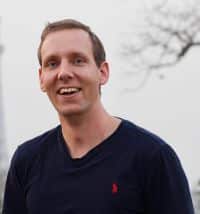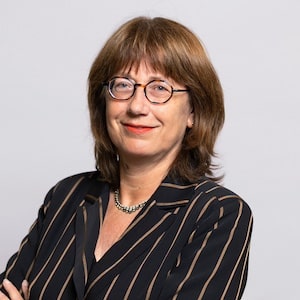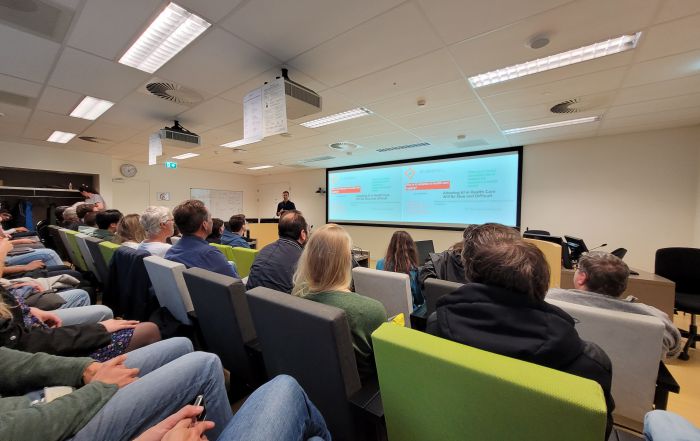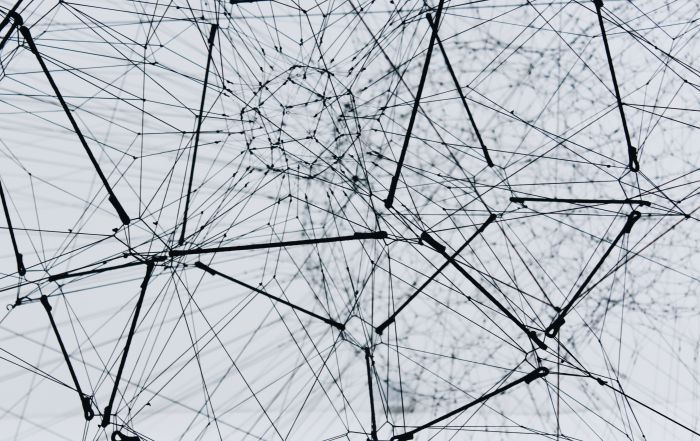25 keer Medical Data & Pizza
Met een looptijd van 5 jaar en 25 edities heeft de reeks Medical Data + Pizza-evenementen een boeiende tijdlijn gevolgd, die de periode omvat waarin AI volwassen werd. We spraken met medeoprichter Mark Hoogendoorn over de uitdagende taak om AI aan het bed te brengen - in Amsterdam en in heel Europa - en over de kracht van pizza om dingen in beweging te krijgen.
Pizza als onweerstaanbaar lokmiddel
Het begon als een eenvoudig concept: cupido spelen tussen twee heel verschillende beesten. Aan de ene kant heb je de datawetenschappers – altijd hongerig naar pizza, maar ook naar echte problemen om op te lossen. En aan de andere kant de medische professionals – die de honger naar pizza delen, maar al genoeg problemen uit de hele wereld hebben.

Mark Hoogendoorn
“Het idee kwam echt van een van de medeoprichters Paul, die altijd manieren bedenkt om verschillende mensen met elkaar in gesprek te brengen. Community–partner Jeroen Maas – destijds werkzaam bij Amsterdam Economic Board – bood aan om de pizza’s te verzorgen en de Pizza Meetups waren geboren. En het valt niet te ontkennen: pizza stimuleert mensen niet alleen om te komen, maar ook om te blijven en verder te praten,” zegt Mark Hoogendoorn, hoogleraar kunstmatige intelligentie aan de afdeling Informatica van de Vrije Universiteit Amsterdam.
Samen met medisch collega Paul Elbers, intensivist en universitair hoofddocent intensive care geneeskunde aan het Amsterdam UMC, vormde Hoogendoorn het Amsterdam Medical Data Science (AMDS) netwerk. Ondersteund door Amsterdam UMC, OLVG, Vrije Universiteit, PacMed en Amsterdam Economic Board groeide het netwerk in de loop der jaren snel tot 2.154 leden en er komen er nog steeds bij. De event-serie Medical Data + Pizza (‘Alles over medische datawetenschap. En pizza’) zou het visitekaartje van het netwerk worden.
Data en pizza bleken een match made in AI heaven. 25 edities later lijkt het evenement alles te hebben bestreken – van het modelleren van ziekenhuisopnames tijdens COVID tot racistische algoritmen en van het laten samenwerken tussen mens en machine tot het voorspellen van de beste medicijncombinaties tegen hersenkanker.
Lees het volledige, Engelstalige interview met Mark Hoogervorst.
Bekijk ook het Engelstalige verslag over de presentaties in de 25e Medical Data + Pizza meetup.
Ben jij een onderzoeker op zoek naar inspiratie of exposure? Schrijf je nu in op de nieuwe AMDS website.
Soms begrijpen medische professionals en datawetenschappers elkaar onvoldoende of kennen ze elkaar zelfs helemaal niet. Ons Right Data Right Now consortium wil daarin verandering brengen!
Tijdens de Medical Data + Pizza meetups bespreken we alles wat met medische data science te maken heeft, inclusief interessante projecten, papers en de laatste ontwikkelingen. Hier ontmoeten artsen en datawetenschappers elkaar. Het is een geweldige kans om te leren, gelijkgestemde zorgprofessionals, onderzoekers en datawetenschappers te ontmoeten, feedback te krijgen op je eigen projecten en plezier te hebben.
De bijeenkomsten van de Amsterdam Medical Data Science Group worden ondersteund door het consortium The Right Data Right Now, dat bestaat uit Amsterdam UMC, OLVG, Vrije Universiteit, Pacmed, Amsterdam Economic Board en Amsterdam AI.
14 november 2023
Meer weten over
Neem contact op
Blijf jij ook op de hoogte?
8x per jaar nieuws en events uit de regio: schrijf je in voor de Board Update nieuwsbrief
Deel dit artikel
Wil je op de hoogte blijven?
Volg ons dagelijks op LinkedIn en schrijf je in voor de Board Update nieuwsbrief.
Lees ook deze berichten
- Eind januari presenteerden D66, VVD en CDA het nieuwe coalitieakkoord, met de ...
- Zes van de tien bedrijven in de Amsterdamse regio maken zich zorgen ...
- De innovatieve kracht van onze regionale industrie zorgt samen met de unieke ...




